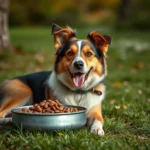
Introduction
Proper nutrition is vital for the overall health and well-being of dogs, and Rottweilers are no exception. This breed, known for its strength and loyalty, has unique nutritional needs that must be met to ensure they thrive. As a Rottweiler owner, understanding the best dog food for Rottweilers is crucial in promoting their health, longevity, and happiness. This comprehensive guide will help you navigate the complexities of canine nutrition, focusing specifically on what Rottweilers require to maintain optimal health.
Understanding Rottweiler Nutritional Needs
Unique Characteristics of Rottweilers
Rottweilers are large, powerful dogs that typically weigh between 80 to 135 pounds and stand 22 to 27 inches tall at the shoulder. Their rapid growth rate in the first few months of life means they require a diet rich in specific nutrients. Additionally, Rottweilers are prone to certain health issues, such as hip dysplasia and obesity, making it essential to choose food that supports joint health and maintains a healthy weight.
Essential Nutrients for Rottweilers
To keep your Rottweiler healthy, it’s important to provide them with a balanced diet that includes the following essential nutrients:
-
Proteins: High-quality protein sources are crucial for muscle development and maintenance. Look for dog foods that list real meat (like chicken, beef, or fish) as the first ingredient.
-
Fats: Healthy fats are essential for energy and maintaining a shiny coat. Omega-3 and Omega-6 fatty acids are particularly beneficial and can support brain health and reduce inflammation.
-
Carbohydrates: While dogs are primarily carnivorous, fiber-rich carbohydrates are important for digestion. Sweet potatoes, brown rice, and peas are great sources.
-
Vitamins and Minerals: Rottweilers need key vitamins (such as A, D, and E) and minerals (like calcium and phosphorus) for various bodily functions, including bone health and immune support.
Types of Dog Food Available
Dry Kibble
Dry kibble is one of the most popular choices among dog owners due to its convenience and affordability. It also promotes dental health by reducing tartar buildup.
Recommended Brands and Formulas:
- Royal Canin Rottweiler Adult: Tailored specifically for Rottweilers, this formula supports joint health and muscle maintenance.
- Orijen Original Dry Dog Food: High in protein and made from fresh, regional ingredients, this kibble is designed for active dogs.
Wet Food
Wet food is often more palatable and can help with hydration, making it a good option for picky eaters.
Recommended Brands and Formulas:
- Hill’s Science Diet Adult Wet Dog Food: This formula contains high-quality protein and supports muscle maintenance.
- Purina Pro Plan Savor Adult Wet Dog Food: A blend of crunchy kibble and tender, meaty pieces that many dogs enjoy.
Raw Diet
The raw diet consists of uncooked meat, organs, and bones. Advocates argue that it can lead to better coat condition and energy levels. However, it comes with risks, like potential contamination and nutritional imbalances.
Guidelines for Transitioning to a Raw Diet:
- Start slow by introducing small amounts of raw food mixed with their regular diet.
- Gradually increase the raw portion over 7-10 days while monitoring your dog’s reactions.
- Consult with a veterinarian to ensure the diet meets all nutritional needs.
Home-Cooked Meals
Preparing meals at home gives you complete control over your dog’s diet but requires time and knowledge.
Essential Ingredients and Recipes for Rottweilers:
- Lean meats (chicken, turkey, beef)
- Vegetables (carrots, peas, spinach)
- Whole grains (brown rice, quinoa)
- Supplement with dog-safe vitamins and minerals.
Factors to Consider When Choosing Dog Food
Age and Life Stage
Rottweilers have different nutritional needs based on their age. Puppies require higher protein levels for growth, while adult dogs need a balanced diet to maintain weight and health. Senior Rottweilers may benefit from diets lower in calories and enriched with joint support supplements.
Activity Level
An active Rottweiler will require more calories than a sedentary one. If your dog engages in regular exercise, choose a high-energy food that supports their active lifestyle.
Allergies and Sensitivities
Some Rottweilers may have food allergies or sensitivities. Common allergens include wheat, soy, and certain proteins. If you notice signs of allergies (like itching or gastrointestinal upset), consult your veterinarian and consider a limited-ingredient diet.
Ingredient Quality
Always read labels carefully. Look for foods that list real meat as the primary ingredient, avoid fillers like corn and soy, and choose brands that source their ingredients responsibly.
Recommended Dog Food Brands for Rottweilers
Premium Dry Food Options
-
Blue Buffalo Life Protection Formula: This kibble features real meat and wholesome grains, with added LifeSource Bits for antioxidants and vitamins. Price: Approximately $60 for a 30-pound bag.
-
Taste of the Wild High Prairie Canine Recipe: A grain-free option made with real roasted bison and roasted lamb. Price: Approximately $55 for a 28-pound bag.
Top Wet Food Choices
-
Merrick Grain-Free Texas Beef & Sweet Potato Recipe: Packed with protein and flavor, this wet food is grain-free and rich in nutrients. Price: Approximately $40 for a case of 12 cans.
-
Wellness CORE Grain-Free Beef, Pork & Lamb Recipe: A nutrient-dense wet food that provides balanced nutrition for Rottweilers. Price: Approximately $45 for a case of 12 cans.
Notable Raw Diet Products
-
Stella & Chewy’s Freeze-Dried Raw Dinner Patties: These freeze-dried patties can be rehydrated and provide a complete raw diet. Price: Approximately $80 for a 16-ounce bag.
-
Primal Pet Foods Raw Frozen Dog Food: Offers a variety of protein options, made with organic fruits and vegetables. Price: Approximately $40 for a 3-pound bag.
Transitioning to New Dog Food
Importance of Gradual Transition
Sudden changes in diet can lead to gastrointestinal upset, including diarrhea and vomiting. A gradual transition allows your dog’s digestive system to acclimate to the new food.
Step-by-Step Guide to Transitioning
- Days 1-3: Mix 25% new food with 75% old food.
- Days 4-6: Mix 50% new food with 50% old food.
- Days 7-10: Mix 75% new food with 25% old food.
- Day 11 Onward: Your dog should be fully transitioned to the new food.
Keep an eye on your Rottweiler for any signs of distress during this transition, and consult your veterinarian if needed.
Common Feeding Mistakes to Avoid
Overfeeding and Obesity
Rottweilers are prone to obesity, which can lead to numerous health issues. Understand your dog’s ideal body weight and consult your veterinarian for guidance on appropriate portion sizes.
Lack of Variety
Feeding your Rottweiler the same food every day can lead to nutritional deficiencies. Introduce variety over time to ensure a well-rounded diet.
Ignoring Portion Control
Measuring food portions accurately is essential to prevent overfeeding. Use a scale or measuring cup to ensure consistency.
Conclusion
Choosing the right food for your Rottweiler is a crucial aspect of their overall health. By understanding their unique nutritional needs and considering factors such as age, activity level, and ingredient quality, you can make informed decisions about their diet. Always consult with your veterinarian to tailor a diet plan that suits your Rottweiler’s specific requirements, ensuring they live a long, healthy, and happy life.
FAQs
What is the best food for Rottweiler puppies?
For Rottweiler puppies, look for high-protein puppy formulas that support growth and development. Brands like Royal Canin and Hill’s Science Diet offer great options.
How much should I feed my adult Rottweiler?
The feeding amount depends on your Rottweiler’s weight and activity level. Generally, an adult Rottweiler requires about 2.5 to 4 cups of high-quality dog food daily, divided into two meals.
Are there specific diets recommended for Rottweilers with health issues?
Yes, Rottweilers with health issues such as hip dysplasia may benefit from diets rich in omega fatty acids and joint-supporting supplements like glucosamine. Always consult your veterinarian for personalized recommendations.









